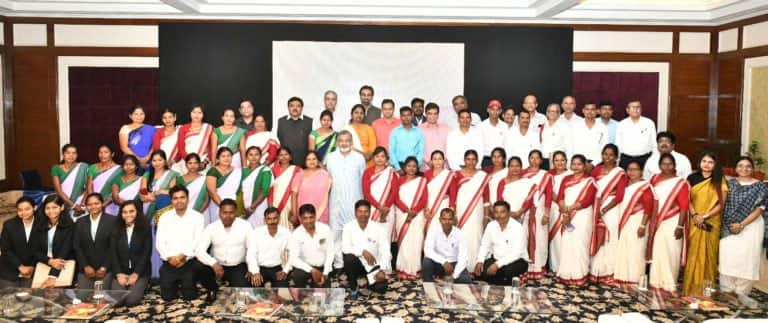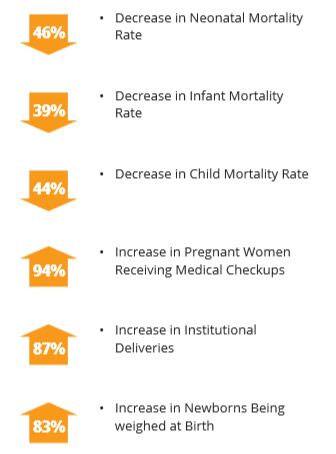Knowledge-sharing and dissemination event for MANSI evaluation report findings
MANSI is a community-focused health intervention that addresses the problem of access to quality and affordable health care for mothers and newborns close to their place of residence.
Trending Photos
)
Ranchi: A Knowledge sharing and dissemination event for the MANSI Evaluation Report was organized in Ranchi on Thursday by Tata Steel Foundation India Foundation, with support from the American India Foundation. The Maternal and Newborn Survival Initiative (MANSI) project in Jharkhand has shown how Sahiyyas (community health workers) when appropriately trained, supported, empowered, and supervised can effectively contribute to improving maternal health and reducing newborn and child mortality. The complete Report can be downloaded from here.
On the occasion, a study depicting the outcome of MANSI’s on-ground implementation was presented by Padmashri Dr. Abhay Bang (Director-SEARCH), in the presence of Dr. Nitin Madan Kulkarni (Secretary, Health), Mr Chanakya Chaudhary (Vice President, Corporate Services, Tata Steel), Mr Sourav Roy (Chief, CSR, Tata Steel), Dr. Shailesh Chaurasia (Mission Director, National Health Mission) and Mr Mathew Joseph (Country Director, American India Foundation), among others.
Addressing the gathering, Dr Nitin Kulkarni, Secretary Health, Government of Jharkhand, described the government’s attention at ensuring the wellbeing of the mother and child, adding the need for the working machinery to continue engaging at all levels of society. He lauded the effort at MANSI, and stressed on the need to scale up the project across Kolhan and West Singhbhum districts of Jharkhand.
On the occasion, Mathew Joseph, AIF Country Director said: “We, at AIF, are delighted with the results of the MANSI project in Jharkhand. We’re deeply grateful for this multi-sectoral collaboration that enabled us to achieve together, what may have been beyond us individually. Especially remarkable is how the government’s own program and workers benefited from both the nonprofit sector and the for-profit sector. We hope the learnings from MANSI will encourage more state governments and corporates to come forward and take it to scale”. He also complimented all partner organizations of AIF that have created and driven a meaningful partnership at MANSI, which has in turn enabled a positive change in society.
Lauding the exemplary contribution of Sahiyyas, Chanakya Chaudhary, VP-CS,Tata Steel said: ‘Sahiyyas are the front runners of the programme and its success solely belongs to them. While the programme was conceived by the founding partners, the real challenge lies in its implementation and Sahiyyas have done a commendable job in achieving its true goals. Tata Steel CSR believes in creating large scale impact through public systems and will continue to address the most complex social challenges facing the communities.’
Sourav Roy, Chief, CSR, Tata Steel emphasized that the tremendous team connect on-ground weaves into the fabric of positive outcomes in MANSI for close to a decade. He added: “We thank our partners who have been our resource of knowledge and implementation. We remain committed to our communities who have reposed their trust in us and have allowed MANSI to be a part of their lives in some of their deeply personal spaces.”
MANSI, a community focused health intervention that addresses the problem of access to quality and affordable health care for mothers and newborns close to their place of residence, was piloted through a public private partnership (PPP) model in Seraikela-Jharkhand among American India Foundation (AIF), Tata Steel Foundation (TSF), Society for Education Action and Research in Community Health (SEARCH) and National Health Mission Jharkhand. MANSI is a simple but effective set of home and community-based interventions relevant and practical in a low resource setting.
At its core lies the empowerment of local Sahiyyas so that they can save lives of newborns in remote rural and tribal areas and more so where there are no doctors or primary health centers for miles. Sahiyyas received training and mentoring in simple life-saving interventions for maternal and newborn health covering the antenatal period, the time around birth and the first month of life, as well as care for small sick newborns and children.

The MANSI Evaluation Report is based on an independent, mixed-methods evaluation, headed by Dr Bang, at Society for Education and Action in Community Health (SEARCH), in partnership with Dr. Ranjani Gopinath. The report utilized quantitative data from vital rate surveys and analysis of home-based neonatal and newborn care, alongside qualitative data from assessment of key stakeholders (including Sahiyyas and health mobilizers), surveys, focus group and interviews with mothers and other key stakeholders.
Highlights of the report are:

More than 90% of the ASHAs trained demonstrated high level of knowledge and skills as a result of the MANSI training and capacity-building approach. ASHAs have instilled confidence in community members who now value and seek out their services, managing most of the low risk neonates, some high risk newborns as well and some cases of pneumonia and diarrhea in children with support from the MANSI supervisors. The ASHAs provided home-based care (HBNC) to mothers and newborns with 91% coverage.

Mothers were highly satisfied with the services of MANSI trained ASHAs (75%). They would like the ASHAs to continue receiving MANSI support (84%).

MANSI represents a story of successful implementation and strong impacts achieved through effective partnerships. With this dissemination of the MANSI Evaluation Report and the learnings from collective experiences, it is hoped that SDG 3 targets will be achieved much ahead of the 2030 timeline, meeting the reduction in neonatal and child mortality.
(By: Rowena Kay Mascarenhas)







)
)
)
)
)
)
)
)
)
)
